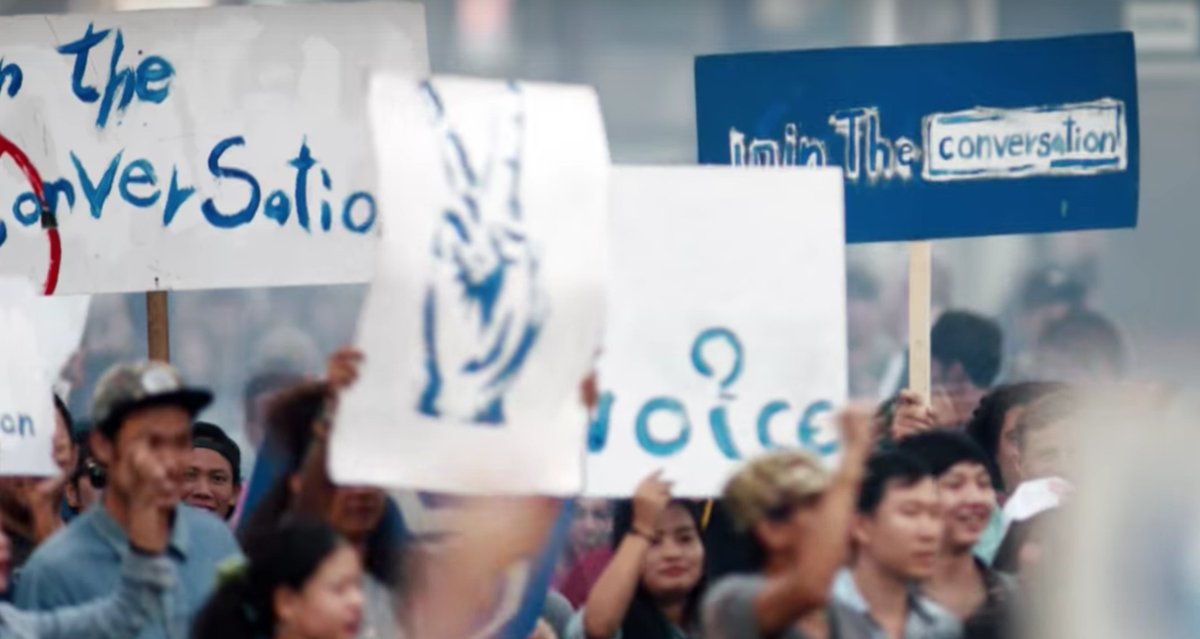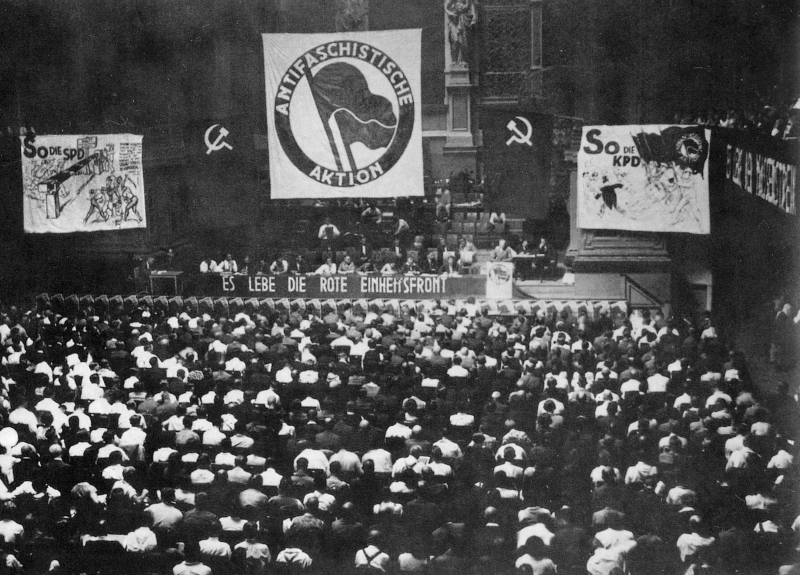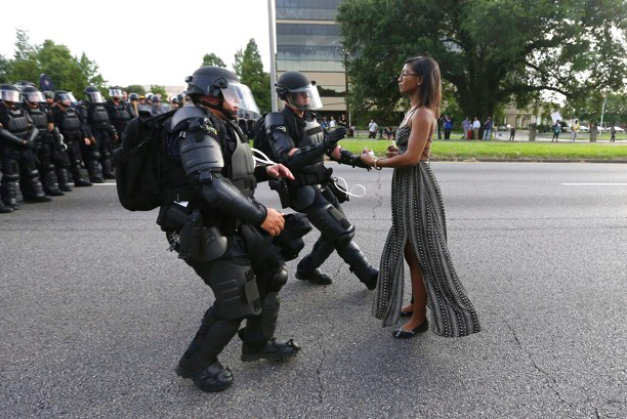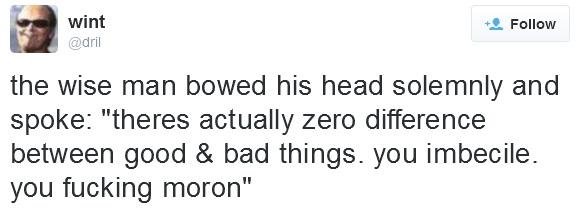Political Action, Power Struggles, and Both Sides: A Response to "An Unbiased Perspective on #Charlottesville"

What follows is a short response to "An Unbiased Perspective on #Charlottesville". More generally, it is a comment on temptations to interpret clashes like the one in Chalottesville as blood sport between misguided, extreme factions whose time would be better spent in conversation.
These interpretations encourage synopses like
At the at the end of the day, if one looked at any two people in a fight swap their positions there wouldn't be much of a difference. It just became this left versus right- red VS blue, team 1 against team 2 kind of factionalism.
I think it's worth thinking about how we got to a point in political discourse where people feel like fighting each other on the streets is going to have some kind of a real-world outcome?
Especially with both 'sides' trying to be right all the time, and upholding one side, instead of trying to see both sides of the situation.
Conclusions like the ones above tend to abstract speech, assembly, and disruption away from the power struggles that give them context. Power struggles are poorly reframed as just violent debates, or arguments that degenerated into bloodshed. I will unpack my last two somewhat handwavy sentences later. First, a few short paragraphs on the relations between speech, assembly, protest, political action, and societal change.
Societal change is delivered by political action, and political action is most effective when it is carried out by organised, mobilised, active groups. A necessary ingredient in political organisation and mobilisation is speech and assembly. It is hard to mobilise without a call to mobilise.
Sure, speech is also necessary for the refinement and development of ideas and arguments through dialectics. But these rallies are not primarily (if at all) intended to facilitate this mode of speech. They are intended as the first step towards collective political action and, ultimately, societal change. If you find these protests counterproductive in facilitating conversation, know that this is why. Facilitating conversation is not the goal, despite the placards seen in an infamous beverage commercial.
What purposes do assembly or protest serve , if not conversation? Assembly can advertises the existence of a group to government and to other members of the group; it can facilitates networking between members of a group, and organised resistance; it can lock like-minded people into close political harmony; it can embolden, intimidate, and even coerce elements of society. In extreme cases, it can spark revolution and the violent overthrow of regimes.

Much of what I've said above is obvious. So how is any of it particularly relevant to Charlottesville and reductive interpretations of the clashes as tribalism?
Counter-protestors believe
- White nationalists and neo-Nazis want to bring about societal change in the form of ethnic cleansing, dis-empowerment, alienation, and suppression of minorities.
- Disruption of neo-Nazi and white nationalist assemblies is action against this harmful societal change.
To put my cards on the table: I think the counter-protesters are right on both counts.
Counter-protesters are not trying-and-failing to muster a counter-argument. They are attempting to directly disrupt political action intended to bring forth an age of white supremacy and neo-Nazism.
To be absolutely clear, I can't and won't offer a blanket defence of violent acts carried out by all self-described "antifa". All I can do is give political action in the form of disruption a historical context that discourages "both sides are bad because they are violent" conclusions.

Antifa rally in Germany, ca. 1932
I would like to bring focus to a particular sentence in the article referenced in the title.
And that's not to say that ever that they're gonna be able to achieve what they want through books and debates and things like that but they're gonna do a lot less damage if they pursue peaceful means to their own agenda."
US and European history is full of examples of civic disruption or armed struggle that isn't peaceful, but has been positive in effect.
The battle of cable street saw working class Londoners disrupt the Mosley fascist march.
Black communities in Mississippi engaged in armed struggle in pursuit of civil rights and in the face of white supremacy.
Martin Luther King explicitly spoke against the dangers of placing peace above all else
"First, I must confess that over the last few years I have been gravely disappointed with the white moderate. I have almost reached the regrettable conclusion that the Negro's great stumbling block in the stride toward freedom is not the White Citizen's Council-er or the Ku Klux Klanner, but the white moderate who is more devoted to "order" than to justice; who prefers a negative peace which is the absence of tension to a positive peace which is the presence of justice; who constantly says "I agree with you in the goal you seek, but I can't agree with your methods of direct action;" who paternalistically feels he can set the timetable for another man's freedom; who lives by the myth of time and who constantly advises the Negro to wait until a "more convenient season."
Above are just a couple of examples of the wide range of positive direct civic action throughout history.
There are, of course, legitimate concerns on the edges of issues like these. People rightly worry about the depreciation of free speech, and the power it may give to states to only permit political change that strengthens themselves, or the chilling effect it might have on dialogue. Christopher Hitchens's defence of free speech is still one of the most compelling I've heard.
But I am optimistic that we can accommodate both the exchange of ideas, free from state intervention, and the disruption of movements which seek to suppress or erase communities. Nobody should feel obliged to defend their right to exist.Another concern is that disruptive action breeds Nazi and white supremacist sympathy. It's certainly true that disruption can produce powerful sympathetic images, and a prominent strategy adopted by Hitler was to portray the left resistance as an inherently violent mob. But this concern once again frames the protest as first and foremost an argument or PR exercise, and not a direct action against an already violent force.

Leshia Evans's arrest in Pennsylvania. Violence often results in images of martyrdom


Counter-protestors are dealing with a movement of perpetual violence. They do not believe they can afford to refrain from political action for PR gains.

tl;dr "Both sides" interpretations of Charlottesville removes vital context from the clash, which is an extension of the still-occurring civil rights movement in America and the resistance of old forces that seek to subjugate and eliminate entire peoples.
